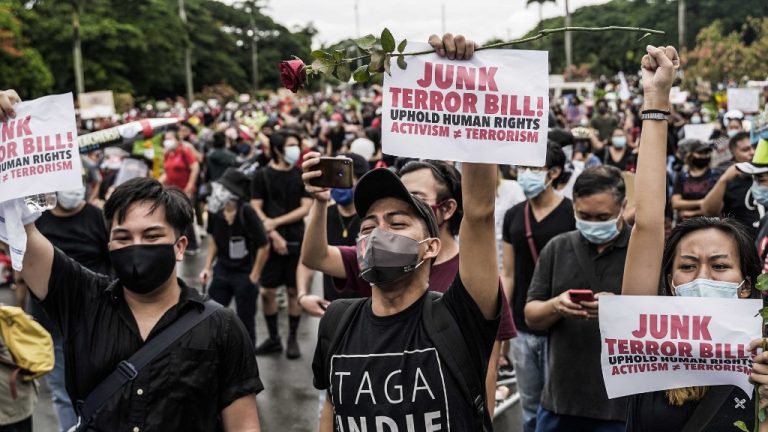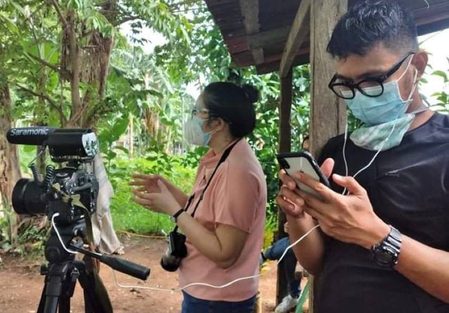
Jun 22, 2022 9:17 PM PHT
Jairo Bolledo
(UPDATED) UP professor Ela Atienza says the move signals an attempt at continuity and flexing of muscles on the part of the NTF-ELCAC, anti-terror, and anti-insurgency groups within the Duterte administration
MANILA, Philippines – Less than two weeks before the new administration takes over, the National Telecommunications Commission, upon the request of National Security Adviser (NSA) Hermogenes Esperon Jr., ordered the blocking of the websites of news organizations Bulatlat and Pinoy Weekly.
The move has legal infirmities, lawyers, including former Supreme Court senior associate justice Antonio Carpio, have pointed out, but Esperon pushed for it anyway. What does this indicate?
administration
MANILA, Philippines – Less than two weeks before the new administration takes over, the National Telecommunications Commission, upon the request of National Security Adviser (NSA) Hermogenes Esperon Jr., ordered the blocking of the websites of news organizations Bulatlat and Pinoy Weekly.
The move has legal infirmities, lawyers, including former Supreme Court senior associate justice Antonio Carpio, have pointed out, but Esperon pushed for it anyway. What does this indicate?

What did Esperon say?
- In his statement on Wednesday, June 22, Esperon justified the blocking of the sites by citing excerpts from two stories published by news site Pinoy Weekly which supposedly mentioned armed struggle and the communist insurgency. He did not cite any excerpt from Bulatlat.
- In Pinoy Weekly’s “Limang Katwiran ng Armadong Pakikibaka,” Esperon highlighted the line: “Marami pang ibang ehemplo sa mundo. Pero ang malinaw: Isang paraan ang armadong pakikibaka para radikal na mabago ang lipunan.” (There are other examples in the world. But one thing is clear: The armed struggle is one of the ways to radically change society.)
- In Pinoy Weekly’s “NPA at Masa, ‘di Matitinag,” the NSA noted the line, “Sa huli, inatasan naman ng CPP (Communist Party of the Philippines) ang NPA (New People’s Army) na palakasin ang pagrerekrut at pagsasanay…(In the end, the CPP instructed the NPA to strengthen recruitment and training).
- Esperon claimed that the excerpts fall under Section 9 and 10 of the anti-terror law. Section 9 of the anti-terror law does not define terrorism and only explains inciting to terrorism. It is section 4 of the law that defines terrorism.
Pinoy Weekly’s reply
In an editorial published on Thursday, June 23, Pinoy Weekly explained the excerpts chosen by Esperon.
- Pinoy Weekly said that in the first story, they simply cited historical facts and knowledge: “Sa maraming pagkakataon sa kasaysayan ng mundo, pinili ng mga mamamayan na mag-aklas para baguhin ang kanilang lipunan. Walang matinong tao ang mag-iisip na pag-iindorso na ito sa New People’s Army (NPA) o paghihikayat na ito sa mga Pilipino na mag-aklas at sumapi sa NPA. Paghahayag lang ito ng historikal na kaalaman,” Pinoy Weekly said.
(In many instances in the history of the world, citizens chose to take up arms to change their society. There are no persons in their right minds who will think that this is an endorsement of the NPA or recruiting Filipinos to take up arms and join the NPA. This is just stating historical knowledge.)
- In the second story that Esperon had also cited as justification, Pinoy Weekly said their writer simply quoted the statement of the CPP. “Malinaw pa sa sikat ng araw na sinisipi lang ng manunulat ang opisyal na pahayag ng CPP. Hindi niya pahayag iyan. Ngayon, bawal na bang sumipi? Bawal nang ikober ang armadong paglaban ng NPA? Hindi na puwedeng interbyuhin ang mga rebelde, kasi anumang pahayag nila, magagamit laban sa mga mamamahayag na puwedeng kasuhan ng pagsuporta sa ‘terorismo’? Ulitin natin: Grabeng kahibangan ito.”
(It’s clearer than the day that the writer is just quoting the official statement of the CPP. It’s not his personal statement. Now, is quoting prohibited? Is it illegal to cover the NPA’s armed struggle? We cannot interview the rebels because whatever they say can be used against journalists who can be accused of supporting “terrorism?” Let us reiterate: This is a different level of foolishness.)
Is it illegal to write about social ills?
Bulatlat and Pinoy Weekly, as alternative media, publish reports that focus on social problems. They often highlight the plight of the vulnerable and disadvantaged in their reports. There is nothing illegal about this under the anti-terror law.
- Former Supreme Court spokesperson Ted Te said, “Writing about social ills does not fall under section 4 or section 9.”
- A line, explained Te, in section 4 of the draconian law distinguishes advocacy and dissent from terrorism: “That, terrorism as defined in this section shall not include advocacy, protest, dissent, stoppage of work, industrial or mass action, and other similar exercises of civil and political rights.”
- The National Union of Journalists of the Philippines (NUJP) also explained that critical reporting should not be equated with affiliation with communist groups: “Bulatlat and Pinoy Weekly have existed for years and have built a track record of reporting on people’s issues. Sometimes, that reporting has been critical of the government and its policies, but it is dangerous to equate this with affiliation or support that the government now claims.”
Making sense of Esperon’s move
Edre Olalia, president of the National Union of Peoples’ Lawyers, said Esperon’s move appears to be an overreach of the anti-terror law: “They are non-sequitur as they were stretched to fit into a prejudged mindset. The faulty leaps in inference and conclusory claims to justify the blocking also appear to be an overreach application as well as a circumvention of the anti-terrorism act.”
- Limited powers. Under the anti-terror law, the anti-terror council, which includes Esperon, has the following limitations, according to Olalia: a) they only have the power to designate, to proscribe, or to file cases; b) they have no power to label, and c) they should not label anyone or any organization.
- Probable cause. The designation powers of the anti-terror council are defined in section 25 of the anti-terror law. But, before designating an individual or groups as terrorists, the anti-terror council must first establish probable cause.
Maria Ela Atienza, professor at the University of the Philippines (UP)-Diliman and former chairperson of the UP Diliman political science department said Esperon’s move may be part of “flexing muscles” and signaling continuity in policies since they will be leaving office in a few days.
- Flexing muscles. “Of course, we don’t know what’s going on inside and in the transition between the outgoing administration and the Bongbong Marcos administration…But it may be the flexing of the muscles of the NTF-ELCAC (National Task Force to End Local Communist Armed Conflict) and the anti-terrorism, and the anti-insurgency groups within the Duterte administration.”
- Continuity of repressive policies. According to Atienza, it also sends a signal of “continuity” that the current administration’s programs will be maintained by the next administration: “Others will say this is [a] last ditch effort on the part of the outgoing administration but I think this signals continuity. Continuity of the red-tagging. At the same time, the repression of traditional media, as well as progressive sectors.”
- Endorsement. Incoming president Ferdinand “Bongbong” Marcos Jr. was technically the continuity candidate of Duterte. Even though Duterte did not endorse Marcos Jr., his party, the ruling party PDP-Laban endorsed the dictator’s son. Duterte’s daughter and incoming vice president Sara Duterte also ran with Marcos Jr.
- Same defense chief. Among the key security officials who will be appointed by Marcos is retired General Jose Faustino Jr., who served as Philippine Army commanding general and Armed Forces of the Philippines chief of staff under Duterte. He will be the next defense chief.
Marcos has named retired political science professor Clarita Carlos as Esperon’s successor – the first woman to hold the post. Will she continue Esperon’s initiatives, given her stated opposition to red-tagging? – Rappler.com